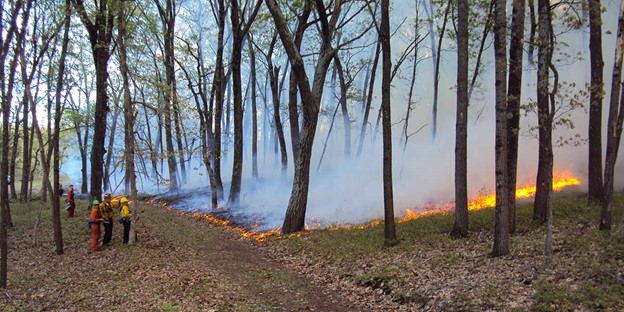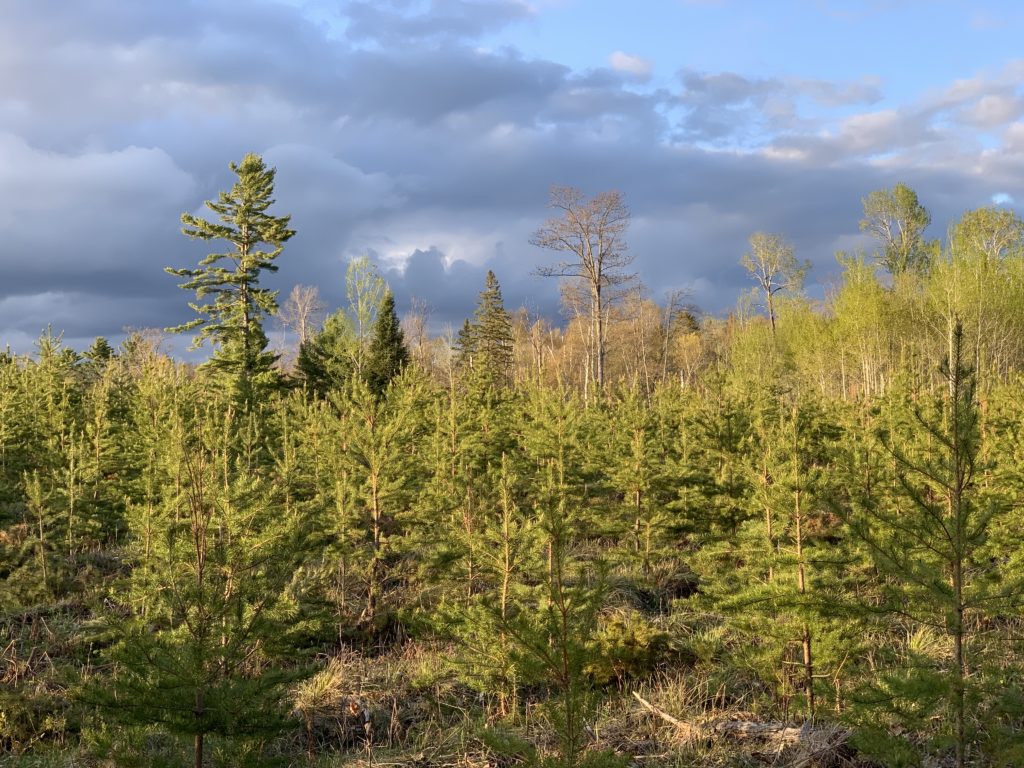WICCI Report: Warmer winters and extreme rain are stressing Wisconsin’s forest resources

Controlled burns can help prepare fire-adapted forests for future conditions. Photo credit: Matt Zine
Written by Dea Larsen Converse, WICCI Communications Director
A focus on climate impacts to Wisconsin’s forests in the most recent assessment from the Wisconsin Initiative on Climate Change Impacts (WICCI) shows that warming temperatures and changing precipitation patterns are impacting Wisconsin’s urban and rural forests. Wisconsin’s average daily temperature has become three degrees Fahrenheit warmer and precipitation has increased 17 percent, about five inches, since 1950. The last two decades have been the warmest on record and last decade was the wettest. The warming climate is stressing Wisconsin’s 17 million acres of forests. It is creating conditions favorable to new pests and diseases. Iconic species like paper birch are vanishing. Logging operations are struggling with storm damaged infrastructure and less frozen ground. Interviews linked to this article detail some of these impacts.

Deer browse damage on a young white pine. White pines are a preferred food source for deer, and repeated browse can stunt or kill young trees. Photo credit: Chequamegon-Nicolet National Forest
WICCI’s Forestry Working Group contributed to the 2021 WICCI Assessment Report and is working to share information across the forestry community about climate change impacts, adaptation, and mitigation. The WICCI Forestry Working Group recommends actions including:
- Keep forests as forests
- Renew forest cover in rural areas
- Encourage tree planting in urban areas
- Pursue climate-focused forest management
- Support Wisconsin wood product utilization
- Update forest plans at the federal, state, county, tribal, and private lands levels to address climate risks with site-specific strategies.
- Support a holistic deer management program that better recognizes the impacts of deer on forest productivity and results in deer population goals that recognize deer-forest impacts.
- Recognize and plan for the operational limitations that affect logging and other forestry operations due to shorter periods of frozen ground and longer periods of extreme wet weather.
- Invest in adaptive logging practices and logging equipment to address or minimize limitations and impacts resulting from shorter winters and more wet conditions.
- Increase emphasis on forest restoration and assisted migration of forest species in light of climate change impacts through applied field studies and by increased nursery capacity.

White pine reserves in clearcut show composition and structure.
American Legion State Forest, Oneida Co., Wis. Photo credit: Ron Eckstein
The group offers their assessment, expands on these solutions, and offers resources to help forest managers adapt to the changing climate on the Forestry Working Group webpage. Example resources include:
Private Landowner Climate Scorecard and Actions (pdf)
Climate Change Field Guide for Northern Wisconsin Forests: Site-Level Considerations and Adaptation
Climate Change Field Guide for Southern Wisconsin Forests: Site-Level Considerations and Adaptation
“Wisconsin forests cover nearly half of Wisconsin and provide a unique opportunity to address climate change by reducing concentrations of greenhouse gases while simultaneously providing essential social, environmental, and economic benefits,” according to Stephen Handler, Guild member and WICCI Forestry Working Group Chair.
WICCI is a nationally recognized collaboration of scientists and stakeholders working together to help foster solutions to climate change in Wisconsin.
